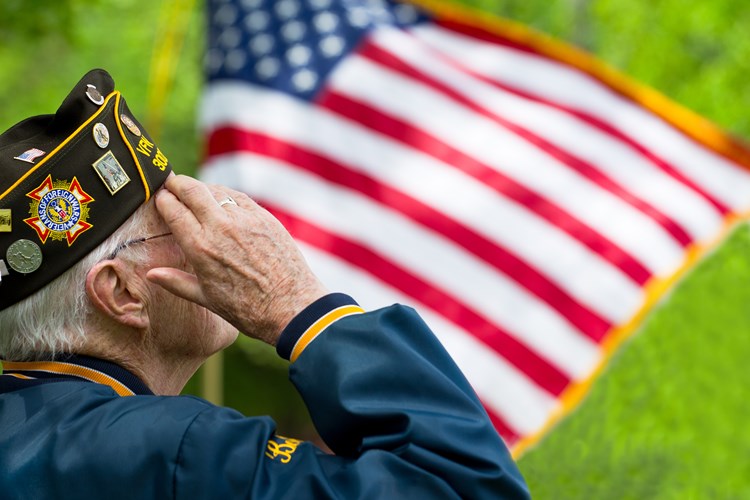Those of us who have not served active duty in the military during wartime cannot begin to understand the emotional scars that remain long after a veteran returns home.
Myra Williams, Community Liaison for Vitas, a provider of hospice and end-of-life care, sees it daily as she interacts with veterans and their families. In many cases, the veteran suffers from Post-Traumatic Stress Disorder (PTSD), which can occur after someone goes through a traumatic event like combat.
At Vitas in Naples, Florida, 25 percent of the patients are vets. Nationwide, Vitas cares for 3,000 veteran patients every day.
As a person ages or nears the end of life, the symptoms of PTSD may worsen or surface for the first time. This presents a challenge for caregivers. The solution is complex, but one strategy is relatively simple, says Williams. "Honor veterans. Provide training for everyone from the family caregiver, receptionist, home health workers, doctors and counselors. Teach them how to interact with a vet who is dealing with the emotional wreckage of war. The most important thing is to build trust with the veteran, and provide an environment where they feel safe."
PTSD: A Wartime Injury
The U.S. Department of Veteran Affairs studied Vietnam vets and found that approximately 26 percent – or a quarter of veterans suffer from PTSD. Why does PTSD occur? A better question is how could it not?
Williams gives a graphic, but very real account of a typical soldier's experience: "Imagine being an 18-year-old boy living and working on the family farm in Nebraska, barely a man with little life experience. You are drafted to serve in World War II. Next thing you know, you are storming the beaches of Normandy, watching soldiers get mowed down."
Williams explains that PTSD is so widely recognized it is now classified as an injury (PTSI), enabling veterans to receive injury benefits.
Symptoms of PTSD
- Difficulty sleeping
- Irritability or outbursts of anger
- Difficulty concentrating
- Hypervigilance (on constant "red alert")
- Feeling jumpy and easily startled
- Recurring dreams and nightmares
PTSD Could Affect Families
If you grew up in a family with a veteran of war—particularly Korea, World War II or Vietnam—you may have seen the veteran exhibit symptoms of PTSD, even if you didn't know what it was at the time. The veteran may have kept everything bottled up, and the family never knew when they were going to explode. Because the veteran never talked about their experience and probably never got a diagnosis, he or she might have unwittingly caused an unstable, erratic and frightening family environment.
Those who lived in such an environment may be traumatized themselves, resulting in a form of PTSD or mental abuse that is passed on to family members. Williams says it's important to understand that the veteran may not realize the environment they created at home. "Some think they had a perfect family. They are unable to recognize that they affected the family dynamic," she says.
However, Williams also believes on some level, "when we hurt the ones we love, we know. What brings about healing is to say, 'I'm sorry, and I own up to what I did.' "
She and her team bring family members together to educate everyone about PTSD. "This is an opportunity to say what needs to be said, especially during the end of the veteran's life. As the family better understands their loved one's personal experience of living the atrocities of war and the reminders the vet lives with every day, hearts can soften." She stresses that World War II veterans have suffered from PTSD for the past 60 years.
Tips for Families with a Veteran in Hospice
Williams offer the following advice for families:
- Bear witness. Ask the vet about his or her personal experience. Say "tell me what it was like." If they open up, be present. Don't rush the story. This could be the first and only time they get out their feelings.
- Understand PTSD. Research the condition, or meet with a hospice counselor.
- See their point of view. If your vet caused an unstable household when you were growing up, try to think of life from their perspective. They went from childhood to adulthood in a war zone, in barbaric conditions that no one should have to bear. Understanding their trauma, you may be able to forgive… but necessarily not forget.
- Treat it as a war injury. Because that's what it is. It's a wound that can't be seen. It's on the inside.
- Recognize their sacrifice. The most impactful words to say to a veteran are, "Thank you." Thank them for putting their life on the line to protect the United States. Williams adds, if your loved one is a Vietnam veteran, say "Welcome home." Returning Vietnam vets did not receive a warm welcome home. Many have never had anyone say that to them.
- Document their experience. Preserve your vet's personal war story for generations to come. The Veterans History Project collects, preserves, and makes accessible the personal accounts of American war veterans so current and future generations hear directly from veterans and better understand the realities of war.
- At the end of life, let go of the body, not the spirit. If your loved one is at the end of life, know what to expect just before death, as the body begins to shut down. This is where bereavement support provides valuable insight into the passing of a loved one.
Williams says the goal of hospice is "to transition veterans to peace at last."
